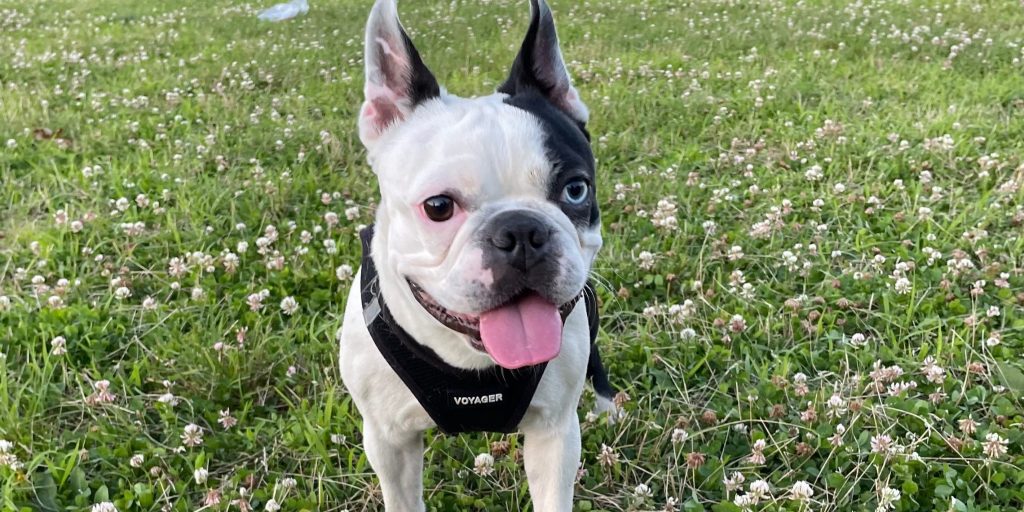- Dogs smell like corn chips because of the bacteria and yeast that make up their microbiomes.
- Owners can mitigate the smell by bathing dogs more regularly and practicing fold care.
- A strong, abnormal smell could be from an infection or other condition that needs veterinary aid.
On any given day, your dog probably has a scent, and it may not exactly smell fresh.
Maybe they smell like a trash can after rolling around on something decomposing in your yard. Maybe they just ran through your sprinkler, bringing that all-too-familiar wet dog smell into your home.
But it's not just your dog's fur that can smell bad. Ever taken a whiff of their paws?
If your dog's paws smell like Fritos, or another version of your favorite corn chip variety, then your dog may have what's called Frito feet.
Don't worry, it's not a sign that your dog just gorged on a bunch of Fritos. Here's what Frito feet actually means as well as other common dog smells and how to keep stinkiness at bay.
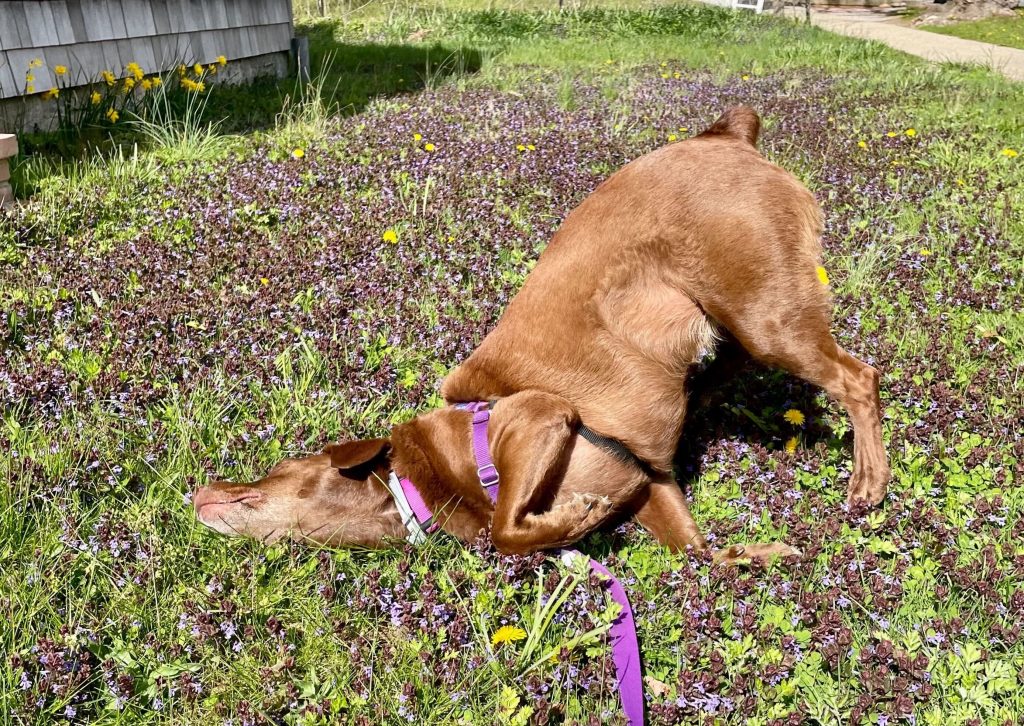
It's normal for your dog to smell like Fritos
The Frito feet phenomenon is due to the mixture of bacteria, fungi, and yeast that usually live harmoniously on your dog's skin, aka, the skin microbiome.
Sometimes, certain stinky microbes grow and out-populate others, which can cause your dog to smell. For example, an overabundance of the bacteria pseudomonas was associated with smelly, but otherwise healthy, bloodhounds in a small 2018 study.
Though it was the bloodhound's skin, not their paws, that were tested for bacteria, pseudomonas could be a player in Frito feet, according to Dr. Aline Rodrigues Hoffmann, a veterinary anatomic pathologist who was one of the study's researchers.
Pseudomonas has a distinct smell described as a sweet, grape-like, and corn tortilla-like.
Dogs can pick pseudomonas up from places the bacteria inhabits in the natural environment, like soil and water. So, when you take your dog for a romp in the park or a swim in the pond, there's a chance that they will pick up pseudomonas and may get Frito feet soon after.
But pseudomonas isn't the only organism that might be causing your dog's smelly paws. Other microbes at play may include:
- The bacteria proteus, which some people say smells like rotten fish as well as — you guessed it — corn tortillas. It prefers moist areas like soil and wastewater.
- Yeast, or malassezia, may also put off a yeasty scent that can mix with these other bacterial smells.
When to worry
Usually, your dog's immune system keeps microbes and pathogens in check at healthy numbers.
But sometimes, "when you get an overgrowth of one over the other, that's when they become opportunistic and create infection," says Dr. Joya Griffin, a veterinary dermatologist at Animal Dermatology Clinic - Louisville.
Some of the same microbes that cause smells can also cause infections if your dog's skin barrier is compromised due to allergies or an autoimmune disorder, or if the bacteria enters the skin through a scratch or wound.
It may be time to take them to a vet if your dog is stinky in addition to exhibiting any of the following symptoms:
- Itching or chewing at the skin or paws
- Redness and inflammation
- Bumps, lesions, or pus-filled sores
- Hair loss or dandruff
"The biggest thing is, if it doesn't smell right or look right, it's always a good idea to have your family vet take a look first. Or, if it's something that's more persistent, and not getting better, potentially seek out an exam by a dermatologist," Griffin says.
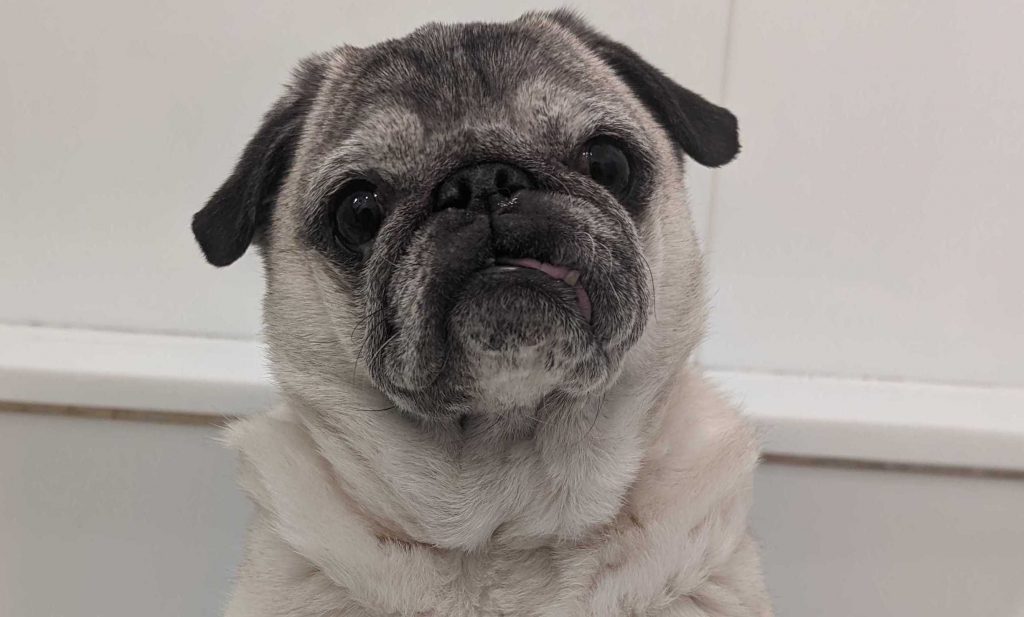
Why are some dogs more smelly?
Some dogs smell more than others. This is due to several factors that can be related to their breed, such as the type and thickness of their coat, their body type, how close their toes are together, and how many skin folds they have.
Between the toes is a particularly ideal area for bacteria to proliferate.
"The toes in dogs are very close together, they have a lot of hairs, and it allows a lot of moisture to accumulate in those areas. Once you have a lot of moisture, you allow those bacteria that are smelly to overgrow, and then you get some smell from their feet," Hoffmann says.
Skin folds are another area where bacteria like to congregate.
"Whenever you have a folded area, there's going to be more moisture, heat, and humidity in those areas, which will promote overgrowth of bacteria and yeast, and a lot of times those folds are what smells like corn chips, because those are areas where there's a lot of overgrowth of bacteria and yeast," Griffin says.
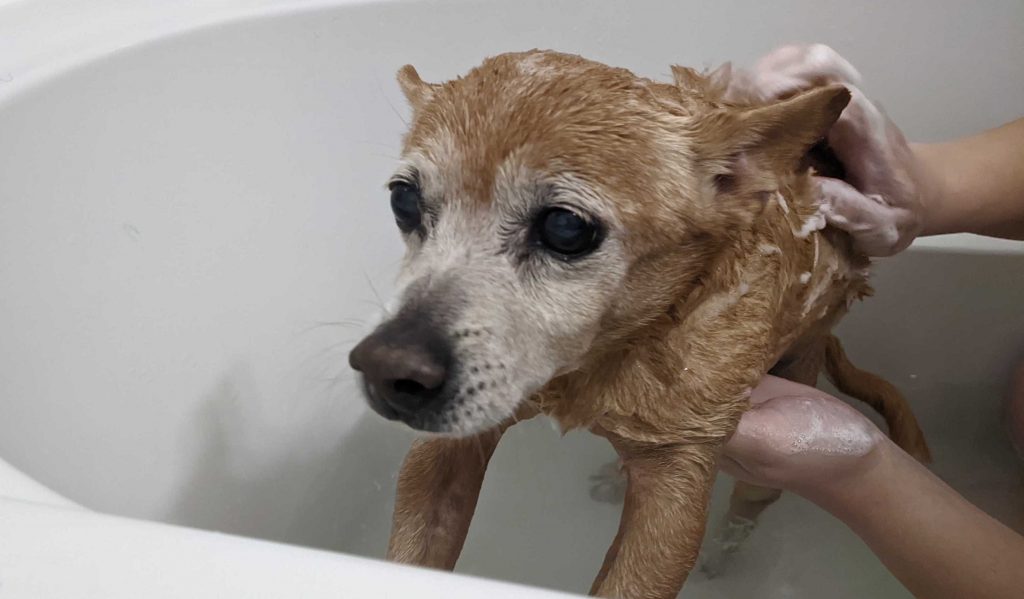
To reduce the odor, wash their feet and bodies more often
If your dog's smell bothers you, try bathing them more often with a gentle dog shampoo. Just be sure not to bathe them so often that it dries out their skin.
"Some people bathe their dogs one or two times a week," Griffin says. "And, when they start to have skin problems, you need to bathe them more frequently, because it helps to restore the barrier function of the skin, increase moisture in the skin, and remove allergens as well as bacteria and yeast overgrowth on the skin."
If over-the-counter dog shampoos don't seem to be doing the trick, visit your vet. They may prescribe a medicated product with more effective active ingredients, such as ketoconazole, salicylic acid, or phytosphingosine, that can help balance out microbial overgrowth and repair the skin.
If you have a dog with skin folds, such as an English bulldog, pug, or shar-pei, you should practice fold care, Griffin says. Fold care is essentially cleaning between the folds, where smells can originate and irritating infections can bloom.
Here's how to practice fold care on your dog:
1. Make a cleaning solution. Griffin says you can either dilute medicated shampoo with water or use medicated wipes.
2. Start in the facial folds. Using a cotton ball, cotton swab, or wipe, clean in between the facial folds.
3. Move to the feet. Clean between the toes and around the paw pads.
4. Clean the groin and armpits. For some dogs, you'll also need to clean around the groin area and under the armpits. Griffin says this is a common area for short, squatty dogs like basset hounds and dachshunds to experience fold dermatitis, or intertrigo.
Overall, any area on your dog that stays hot and moist should receive a little extra attention when cleaning.
If you are regularly bathing your dog but find that you can't bathe the smell away, you should visit your family vet to make sure there are no underlying conditions, such as dental issues or yeast overgrowth, related to the smell.
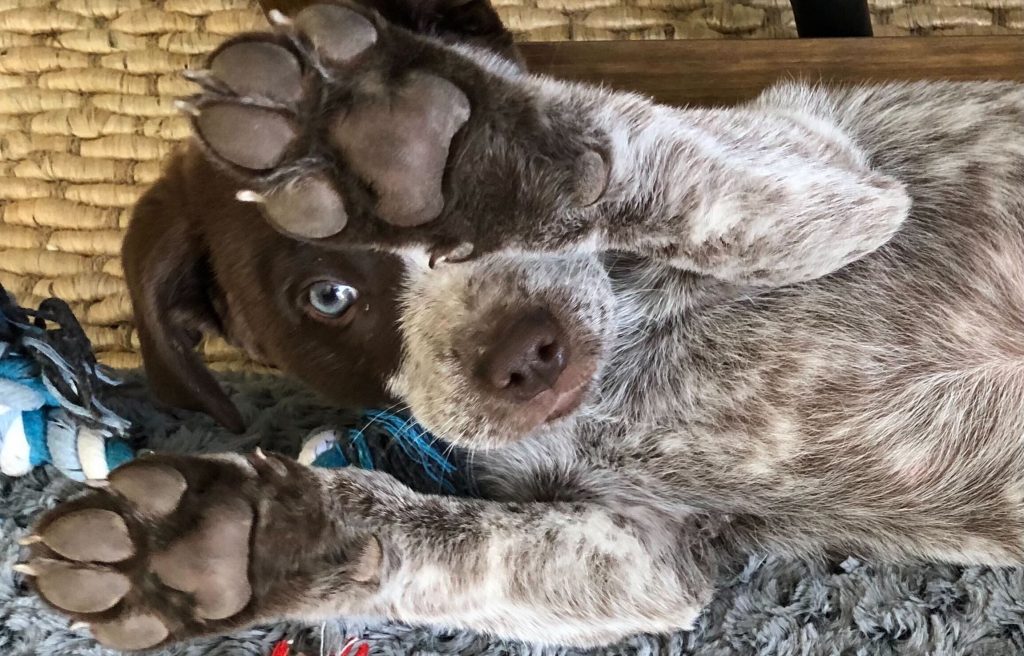
What does this mean for dog owners?
Both pseudomonas and proteus can cause infections in immunocompromised humans, especially in hospital settings. However, Hoffmann says this isn't something healthy people need to be concerned about.
In fact, sharing some bacteria and fungi with your dog may actually be a good thing. A 2013 study found that adults who lived with dogs had a more diverse skin microbiome — thanks to sharing microbes with their pooch — than people without dogs.
And researchers have found that when you expose healthy people to a greater diversity of microorganisms, it can strengthen the human immune system, helping the body respond better to harmful pathogens, and reducing the likelihood of immune system overreactions to harmless microbes.
"So in general, you do want to have diversity in your microbiome. And the dogs bring that, they increase the diversity of the human microbiome whenever they are sharing a household," Hoffmann says.
Other dog smells and what they mean
Certain dog smells can be a telltale sign that something isn't right with their health.
Here are a few common dog smells and how to treat them:
- Fishy smell: This smell usually indicates that their anal glands, or anal sacs, are either impacted or infected. They may also exhibit other symptoms, such as butt dragging. If this happens, you'll need to take your dog to their vet to have their anal glands expressed and examined.
- Rotten breath: They might have dental issues, such as plaque buildup, gingivitis, or ulcers. This smell may also migrate: "If they lick themselves and then they have halitosis or bad breath because of dental disease, then sometimes their body starts to also stink," Griffin says. If you think this is the case, take them to your vet for an examination and teeth cleaning.
- Rancid smell: A rancid, yeasty smell is usually associated with an overgrowth of the yeast malassezia. If this is the case, your dog will display other symptoms, including scaly, crusty skin, hair loss, and itchiness. Your vet will prescribe a topical shampoo to treat the condition.
- Strong ear smell: According to Griffin, a strong smell, along with a change in appearance, is usually the first sign of an ear infection in dogs. Your dog may also begin to shake their head or scratch around the ear area. Your vet will usually perform a medicated ear cleaning and may prescribe a topical treatment. If the infection is bad enough, it could call for oral antibiotics.
- Breath smells like urine or ammonia: If your dog's breath is very bad and smells reminiscent of urine, it could be a sign of kidney disease. This condition would be accompanied by other symptoms, such as vomiting and weight loss. If you suspect your dog may have this condition, take them to a vet as soon as possible.
- Wet dog: There's not much you can do here, except dry your dog thoroughly with a towel. This extremely common smell is due to volatile compounds from the microorganisms in your dog's fur, which evaporate along with the water.
- Skunk smell: If your dog got into it with a skunk, you can get rid of the smell by washing them with a mixture of baking soda, mild dish soap, and hydrogen peroxide, according to the American Kennel Club.
Griffin says it's important to try to find the focal point of any smell that isn't normal for your dog. That way, you can examine it to see if it's red and inflamed, itchy, or painful.
Insider's takeaway
In general, body odor is a normal part of being a dog.
Dog's skin is populated by bacteria, yeast, and fungi that can cause strange smells but are typically harmless and can even make your dog healthier.
If your dog is experiencing discomfort and symptoms like inflammation, lesions, and itching, however, you should probably take them to your family vet. Bacteria or yeast may have overgrown on your dog's skin, causing the irritation. Your vet can prescribe medicated shampoos to treat the overgrowth.
Other dog smells you should look out for include a strong ear smell, rotten breath, or a rancid, yeasty smell. These could point to other conditions, such as dental disease or ear infections, that need veterinary attention.
